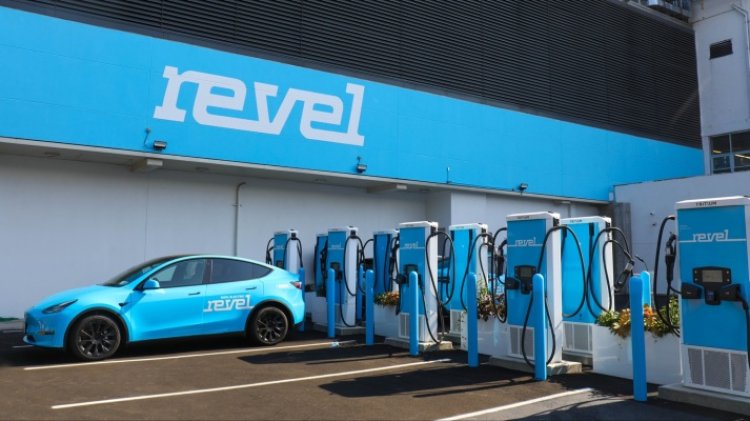Revel to expand EV fast-charging network with backing from BlackRock
Revel, the Brooklyn-based startup that first made a name for itself with its iconic shared blue electric mopeds in New York City, has raised a $126 million Series B in a funding round led by BlackRock Renewable Power. Toyota Ventures, an existing investor, also participated in the round, along with Goodyear Ventures, Shell Ventures, Broadscale […]

Revel, the Brooklyn-based startup that first made a name for itself with its iconic shared blue electric mopeds in New York City, has raised a $126 million Series B in a funding round led by BlackRock Renewable Power.
Toyota Ventures, an existing investor, also participated in the round, along with Goodyear Ventures, Shell Ventures, Broadscale Group, the St Baker Energy Innovation Fund and an account managed by Knighthead Capital Management. The latest investment, following a $34 million Series A last year, brings the company’s total funding to around $165 million.
Representatives from BlackRock and Toyota Ventures will join Revel’s board of directors, according to the company.
Revel plans to use the funds to expand its network of EV fast-charging “Superhubs” throughout 2022. The company wouldn’t share many specifics, but it said it would have 10 to 25 universal DC-fast chargers and sites operating across NYC and potentially other major cities in the U.S., as well.
“This investment is highly complementary to our existing portfolio of investments in the rapidly growing EV charging infrastructure space, which presents an attractive opportunity for our clients as we continue to support the energy transition,” Martin Torres, Head of the Americas for BlackRock, said in a statement.
Revel launched its first — and so far only –Superhub in Brooklyn with 25 charge points last June, and like that one, all of the new hubs will be open to the public 24/7 and accessible to any brand of EV.
“Urban charging infrastructure is the missing piece that’s kept millions of drivers from making the switch to EVs, and with this funding Revel will be able to build it in cities across the country,” CEO and co-founder Frank Reig said in a statement.
While consumer and commercial EV use grows, Revel’s Brooklyn charging station has had guaranteed utilization from the company itself, which launched an all-EV (all-Tesla, no less) ride-hail service in Manhattan last August. There was some initial conflict with NYC’s Taxi and Limousine Commission (TLC), which had issued a cap on new taxis from entering the over-saturated market, but Revel was ultimately able to rely on an exemption for electric and wheelchair-accessible vehicles to gain approval to launch. Perhaps the fact that it actually employs its drivers and provides benefits lent a helping hand to the company’s cause.
The TLC did not immediately respond to requests for more information about Revel’s ongoing status as a taxi operator.
While the moped service will continue, Revel is winding down one of its business units – e-bike subscriptions. The company launched a limited service a year ago, but realizes that the market is trending more toward an ownership rather than a subscription model as e-bikes become increasingly affordable.
“Revel’s vertical integration of electric vehicle options on top of fast-charging EV Superhubs maximizes both consumer choice and infrastructure utilization,” Jim Adler, founding managing director of Toyota Ventures, said in a statement. “It’s the right strategy to provide accessible transit that lowers city carbon emissions, improves the health of the planet and drives Revel’s success in the most lucrative markets in the world.”







